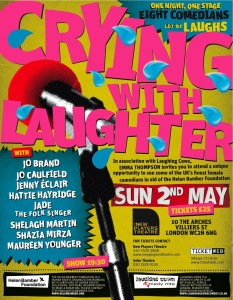Thinking of organising a charity comedy night? Need to get some comics on board? Then these tips may be of help!
1. Do bear in mind that you’re not the first person to come up with the idea. Comics get asked to do them all the time. One week I had 4 different requests to perform at a comedy charity night as well as someone asking me to donate all the proceeds of one of my own comedy nights to their charity. I had to point out to them that all the proceeds from my comedy nights went to paying the comics. It is their livelihood after all. Just think, if I get so many requests, goodness knows how many requests comics receive who actually have a TV/radio profile.
2. Have the night midweek or on a Sunday. Fridays and Saturdays are when comics are busiest and the gigs pay more. If you go for a midweek option/Sunday, comics are more likely to say yes.
3. Choose comics that are right for your charity and the audience you are likely to attract. Obviously if it’s a women’s aid charity then you don’t want to book a comedian who specialises in misogynist material. This may be easier said then done, particularly if you don’t really know much about comedy. If you’re lucky and know a good comic, then seek their advice/recommendations. Otherwise it may mean doing the rounds of a few comedy nights, seeing if anyone is the right fit and emailing them afterwards.
4. There are three main categories of comics. You have your big comedy stars, generally those you see on TV. Unless you have some personal way in, the chances of the big comedy stars saying yes is minimal. Even trying to get hold of them in order to ask will prove a minefield. Then there are the established acts who work the circuit. They may not be on TV but many of them are incredibly gifted comics. Often they will say yes, if their diary permits it. Bear in mind however that if they then get paid work in, they may be tempted to take it. That’s not them being greedy. They most likely simply need the money. Newer comics (semi-professionals and open spots) will usually be more than happy to perform just for the stage time. Charity nights are often preferable than doing an open mic night where the audience may well consist of 5 disgruntled-looking, fellow comics who’ve heard their particular set many a time before. Open mic acts can range from those with a lot of potential to those with not so much. Again it’s always best to ask someone, whose comedy nous you trust, what they think or ask for links to clips of the acts performing.
5. It’s also best to let someone do the running order who knows something about comedy and ideally knows something about the comics who will be performing. The right running order will make a huge difference to the overall show.
6. Book ahead. Comics’ diaries fill up months in advance, particularly those of the more established acts. Therefore it’s best to get in there as early as you can or you may find yourself in the frustrating situation where a comic would have loved to do the night but is already booked up.
7. Ensure you have got a solid MC. If you have no comedy experience, do not be tempted to do it yourself. Good emceeing like good impro looks deceptively easy. It’s not. It’s a skill and having a solid MC on board can and will make a huge difference to the night.
8. By the same token, comedy doesn’t really work being slotted in between different types of performance. If the night is a mixed bag of tricks, for goodness sake put the comedy on all together.
9. Choose a room that works for comedy. A lot of charity nights are a pain to perform at because some people mistakenly believe that comedy works anywhere. I once travelled to a gig with a fellow comic and we joked how it would be a long thin room, with strip lighting, a radio mic that didn’t work properly, round tables so that half the audience would have their back to us, no stage lighting and no stage. On entering the room, we couldn’t help high fiving each other as we realised we had guessed correctly. The worst such experience for me was a room where everyone had been drinking for the previous 4 hours and a rather loud game of beer ping pong was going on in the background. Needless to say, it’s always a bad sign when a band is on before you and no one is listening to them despite the advantage of 2 electric guitars and a set of drums. In addition, the stage was lower than where most of the audience was standing (for the record a standing audience is never ideal), the mic lead was wrapped tightly round the mic stand (for the record not ideal for stand up comedy) and the mic stand for some inexplicable reason was actually in the one place on the stage which wasn’t lit (for the record not ideal for any kind of performance). Even better, the mic was on such a short lead so I couldn’t actually move into the light. Did the gig go well? What do you think?
10. Have a budget. Most comics I know are generous souls who will gladly give up their time for numerous charities. However, most of us aren’t rich. On several occasions I’ve been asked to perform at a charity gig which would involve some travelling. Generally when you ask if expenses are covered, the usual reply is ‘we don’t have a budget’. However, news flash: neither do most comics. In effect, not only are you asking us to do you a favour and travel for a couple of hours there and back again, then perform for free but actually expect us to be the one out of pocket. And whereas most comics won’t begrudge the odd local bus or tube fare, it’s a different matter when it comes to more expensive modes of transport. Leaving some of the big boys aside who can easily pack the 02, most comics are not inundated with so much money that they are contemplating opening up a Swiss bank account with HSBC. I was asked to do one charity gig which would have required a £30 train fare. On top of that the venue was unreachable by local transport and would have required a £15 taxi there and another one back again. I was on so late in the evening I wouldn’t have been able to get the train back home so would have needed to stay in a hotel. Luckily for me I had a friend in the area. She was happy to let me stay at hers as well as be my personal, free taxi service. Otherwise the gig could have cost me near enough a £100 in expenses. It’s unfair to expect comics to foot such a bill or fail to make arrangements so they don’t have to. Ironically, often the only person not being paid at these comedy charity nights are the comics. The theatre and its staff are being paid; the charity’s staff is often being paid, so perhaps the least you can do is offer to pay for the train ticket. What is often galling is that you’re often asked to put you hands in your pocket by someone who, you suspect, is earning a lot more than you are. So if you’re expecting a comic to fork out for what may well be a gig in an unplayable room on their night off, then don’t be that surprised if it turns out they decide they can’t do it.
11. If you want to talk about the work of the charity at the event, think about what you want to say and when to say it, and above all keep it short. I had one colleague phone me up from a charity night who had had the misfortune to follow a woman who gave a speech for the charity mid-show and closed her spiel with the line: Don’t forget, every 3 minutes a woman is raped. Now back to the comedy. How the hell are you supposed to follow that? When I’ve organised charity nights, I tend to get the charity to talk just before the interval. That way no comic has to follow them and what they’ve said is fresh in the audience’s mind as they make their way to the bar and hopefully past a few collection buckets.
12. Comedy nights don’t sell themselves. Unless you have a major act on, putting on a comedy night and posting it in a few listings and on Facebook does not a sell-out make. As I say, you need to know who your target audience is, book the right acts for that audience and promote the hell out of the night. Remember, it’s not up to the comics to promote the night for you. They’ll have numerous other gigs in their diary, and after all their job is to turn up on the night and (hopefully) be funny. Nor will they bring legions of friends and family with them. Most friends and family disappear after the first half a dozen gigs a comic does.
13. Comics do not want to get there several hours before show time to “practice”. (I know someone who was actually asked to do that). Nor do we want to get there ridiculously early for in-depth briefings on what the charity does. There may be the odd dedicated comic who would be interested but for the most part we’d rather have a more reasonable call time, maximum one hour before the show. Music acts are of course an exception to the rule. They will invariably want to arrive early and do a sound check.
14. Be nice. Show your appreciation. After all the comics are doing you a favour. At the very least provide some water backstage and maybe a few nibbles. I did one charity gig where the guy whose charity it was actually sat in the front and texted throughout the headliner’s act and had previously stood up and went for drinks while another act was on. Needless to say none of us were in a hurry to gig for him again.
In short, most comics are happy to donate their services to a worthy cause. However, being a stand up involves a lot of travelling and a lot of graft. So much so that if the specialised subject on Mastermind was on service stations on the M1, your average comic could go head to head with your average lorry driver. So if you want comics to do you a favour, just try and see it from their point of view. The chances of an established Brighton or London-based comic going up to Manchester on a Saturday night for no fee and no expenses to perform at a charity comedy show are clearly going to be non-existent. Change it to a midweek date, ask some good local comedians (of which there are many) and you’ve got yourself a gig. So although these tips can’t guarantee a great comedy night, hopefully they may help you in getting on board the one essential ingredient in putting together a first-rate comedy show – the comics.
© Maureen Younger and www.maureenyounger.com [2013-2019]. Unauthorized use and/or duplication of this material without express and written permission from this blog’s author and/or owner is strictly prohibited. Excerpts and links may be used, provided that full and clear credit is given to Maureen Younger and www.maureenyounger.com with appropriate and specific direction to the original content.


